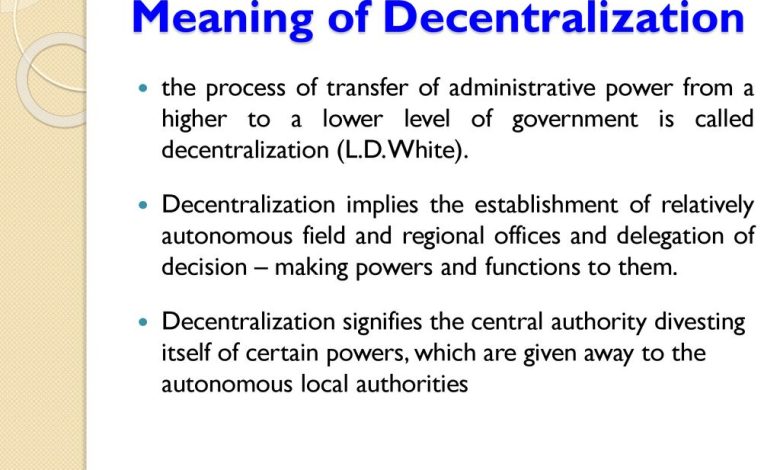Understanding the Concept of Decentralization

- Exploring the Basics of Decentralization
- The Advantages of Decentralized Systems
- Challenges of Implementing Decentralization
- Examples of Successful Decentralized Projects
- The Role of Blockchain in Decentralization
- Future Trends in Decentralized Technologies
Exploring the Basics of Decentralization
Decentralization is a concept that involves the distribution of power and decision-making authority away from a central authority to multiple entities or individuals. This approach aims to promote autonomy, efficiency, and innovation by allowing for more localized control and decision-making. By dispersing power, decentralization can help prevent the concentration of power in the hands of a few, reducing the risk of corruption and abuse of power.
One of the key benefits of decentralization is that it can lead to more responsive and tailored solutions to local issues and challenges. When decision-making authority is decentralized, local communities or organizations can adapt policies and strategies to better meet their specific needs and circumstances. This flexibility can result in more effective and sustainable outcomes, as decisions are made by those who are closest to the situation and have a better understanding of the context.
Decentralization can take many forms, including political, administrative, and fiscal decentralization. Political decentralization involves the transfer of political power from a central government to local or regional authorities. Administrative decentralization, on the other hand, involves delegating decision-making authority to lower levels of government or to semi-autonomous agencies. Fiscal decentralization refers to the allocation of financial resources and revenue-raising powers to subnational entities.
Overall, decentralization can help promote democracy, accountability, and participation by empowering local communities and organizations to have a greater say in the decisions that affect them. By distributing power more evenly and allowing for greater autonomy, decentralization can lead to more inclusive and responsive governance systems that better reflect the diverse needs and interests of the population.
The Advantages of Decentralized Systems
Decentralized systems offer numerous advantages that make them a popular choice for various applications. One of the key benefits of decentralized systems is their resilience to single points of failure. In a decentralized network, there is no central authority that can be targeted by malicious actors, making it more secure and less vulnerable to attacks.
Another advantage of decentralized systems is their scalability. By distributing tasks across a network of nodes, decentralized systems can handle a large volume of transactions without experiencing bottlenecks. This makes them ideal for applications that require high throughput and low latency.
Decentralized systems also promote transparency and trust among participants. Since the data is stored on multiple nodes in the network, it is difficult to manipulate or alter, ensuring the integrity of the system. This transparency builds trust among users and eliminates the need for intermediaries.
Furthermore, decentralized systems are cost-effective as they eliminate the need for expensive infrastructure and maintenance. By leveraging the resources of network participants, decentralized systems can operate more efficiently and at a lower cost than centralized systems.
In conclusion, decentralized systems offer a range of advantages including resilience, scalability, transparency, trust, and cost-effectiveness. These benefits make decentralized systems an attractive option for a wide range of applications across various industries.
Challenges of Implementing Decentralization
Implementing decentralization can present various challenges that organizations need to address in order to successfully transition to a decentralized system. One of the main challenges is the resistance to change from employees who may be accustomed to a centralized structure. This resistance can lead to a lack of buy-in and cooperation, hindering the effectiveness of the decentralization process.
Another challenge is the need for clear communication and coordination among different departments or units within the organization. Without proper communication channels and coordination mechanisms in place, decentralized decision-making can lead to confusion, duplication of efforts, and inefficiencies. It is essential for organizations to establish robust communication protocols and mechanisms to ensure smooth operations in a decentralized setup.
Additionally, decentralization can also pose challenges in terms of accountability and transparency. With decision-making authority dispersed across various levels, it can be difficult to track and monitor the outcomes of decisions. This lack of accountability can result in a lack of transparency and oversight, potentially leading to issues such as corruption or mismanagement.
Moreover, decentralization can also lead to challenges in terms of resource allocation and budgeting. With decision-making authority decentralized, it can be challenging to allocate resources effectively and ensure that budgets are managed efficiently. Organizations need to develop clear guidelines and processes for resource allocation to prevent disparities and ensure equitable distribution of resources.
In conclusion, while decentralization can offer numerous benefits, it is crucial for organizations to be aware of and address the challenges that come with its implementation. By addressing issues such as resistance to change, communication and coordination, accountability and transparency, and resource allocation, organizations can successfully navigate the transition to a decentralized system and reap the benefits it offers.
Examples of Successful Decentralized Projects
There are several examples of successful decentralized projects that have gained popularity in recent years. These projects have demonstrated the effectiveness of decentralization in various industries, showcasing the benefits of distributed networks and consensus mechanisms.
- Ethereum: Ethereum is a decentralized platform that enables developers to build and deploy smart contracts and decentralized applications (dApps). It has become a cornerstone of the decentralized finance (DeFi) ecosystem, allowing for the creation of various financial products and services without the need for traditional intermediaries.
- Bitcoin: Bitcoin is the first and most well-known decentralized cryptocurrency, operating on a peer-to-peer network without the need for a central authority. It has revolutionized the concept of digital currency and has paved the way for the development of numerous other cryptocurrencies and blockchain projects.
- IPFS: The InterPlanetary File System (IPFS) is a decentralized protocol that aims to create a more resilient and efficient way to store and share information on the internet. By utilizing a distributed network of nodes, IPFS allows for content to be stored and accessed in a decentralized manner, reducing reliance on centralized servers.
- Uniswap: Uniswap is a decentralized exchange (DEX) built on the Ethereum blockchain that enables users to trade cryptocurrencies directly from their wallets. It utilizes an automated market maker (AMM) mechanism to facilitate trades, allowing for greater liquidity and accessibility compared to traditional centralized exchanges.
These examples highlight the diverse applications of decentralization across various sectors, showcasing the potential for innovation and disruption in industries traditionally dominated by centralized entities. As decentralized projects continue to evolve and gain traction, they are reshaping the way we interact with technology and finance, ushering in a new era of trustless and permissionless systems.
The Role of Blockchain in Decentralization
Blockchain technology plays a crucial role in the concept of decentralization. By utilizing a distributed ledger system, blockchain allows for the secure and transparent recording of transactions across a network of computers. This eliminates the need for a central authority to oversee and validate transactions, thereby decentralizing power and control.
One of the key benefits of blockchain in decentralization is its ability to create trust among participants in a network without the need for intermediaries. This trust is established through the consensus mechanism, where all parties involved must agree on the validity of a transaction before it is added to the blockchain. This ensures that no single entity can manipulate the system for their own gain.
Furthermore, blockchain technology enables greater transparency and accountability in decentralized systems. Since all transactions are recorded on a public ledger that is immutable and tamper-proof, participants can easily verify the integrity of the data without relying on a central authority. This helps to prevent fraud and corruption, making decentralized systems more efficient and trustworthy.
Overall, blockchain technology serves as a foundational pillar for decentralization by providing a secure, transparent, and trustless framework for conducting transactions and managing data. As the technology continues to evolve and be adopted in various industries, it has the potential to revolutionize the way we interact with each other and the systems that govern our society.
Future Trends in Decentralized Technologies
The future of decentralized technologies is promising, with many advancements on the horizon. One trend to watch out for is the rise of blockchain technology, which has the potential to revolutionize various industries. Blockchain allows for secure and transparent transactions without the need for intermediaries, making it a popular choice for businesses looking to streamline their operations.
Another trend to keep an eye on is the growth of decentralized finance (DeFi). DeFi platforms are disrupting traditional financial systems by offering services such as lending, borrowing, and trading without the need for banks or other centralized institutions. This trend is gaining traction as more people seek alternatives to traditional banking.
Additionally, the Internet of Things (IoT) is expected to play a significant role in the future of decentralized technologies. IoT devices can communicate and interact with each other autonomously, creating a network of connected devices that can operate without central control. This has the potential to revolutionize industries such as healthcare, transportation, and manufacturing.



